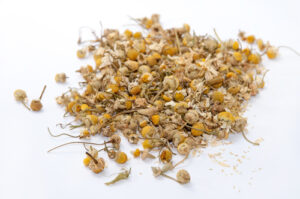What's On This Page?
ToggleToday I’d like to present and updated view on chamomile, an herb that can be used for much more than sleep and anxiety. About a million cups of this herbal tea are served every single day! The antioxidant compounds in chamomile, including apigenin, have been proven useful for a variety of issues that might concern you. I’ve actually put some chamomile extract in my patented Sleep formula because it can support tranquility for those toss-and-turn nights.*
But today, I’m going to share other unexpected benefits of chamomile.
For example, if you thought the only way to thin your blood was with warfarin, you would be wrong. Here are some benefits of chamomile that you may not have heard of:
Blood Thinning and Chamomile
Having thick or ‘sticky’ blood is bad for you. Doctors seek to thin blood to prevent clots, strokes and heart attacks. Warfarin is the most popular anti-coagulant that is prescribed. There are many plant-derived supplements that work similarly to warfarin, as well as foods with anti-platelet activity. But chamomile wouldn’t normally be something you think of for blood health.
There was a scientific paper published in the British Journal of Pharmacology in June 2020, that reviewed 149 different herbs, supplements and foods that interact with warfarin. Sushi was listed too, so was cannabis, cranberry, green tea, ginkgo biloba, spinach and ginger. This just makes me realize that if you can keep your blood flowing nicely and keep it thin using holistic herbs and foods, then it will be less likely to form clots where you need medical attention or drugs.
In 2005, there was a test tube STUDY that concluded “chamomile, nettle and alfalfa have potent anti-platelet properties.” In light of chamomile’s gentle blood-thinning properties, I advise caution or avoidance of this herb if you are already taking warfarin because the two together will exacerbate the actions of each and lead to excessive bleeding. Gum bleeding might be the first sign of additive anti-platelet activity in the body. Easy bruising might be another sign.
How to derive benefits for this use:
The best way to derive long-term benefits is to enjoy 1 cup of chamomile tea at night, or take a dietary supplement that contains it. You will find this herb in herbal sleep aids including my own patented formula. You can get your own copy of this FREE ebook on the topic of sleep, CLICK HERE.
Chamomile oil also caused a significant decrease in High-density lipoprotein (HDL), Low-density lipoprotein (LDL), and total cholesterol levels.
Have Mouth Pain?
Have you ever burnt your tongue or mouth on hot coffee, or a super hot pizza? Sometimes you do nothing at all, and your mouth burns. Oral pain is one of the most uncomfortable concerns to deal with. But fortunately, if you burn your mouth it heals right away, within a week or so.
But if you are receiving chemotherapy, there is a type of mouth pain that is unbearable. It can occur with high dose local radiation in the mouth. The term for the pain is oral mucositis or “OM,” and it’s painful, and highly intolerable! Sometimes a person is able to speak after a treatment, and they cannot tell you of this pain.
I worked in nursing home settings and saw this a lot. So if you’re a caregiver, nurse or family member, please become more aware of any non-verbal cues, so you can tell if a person is dealing with OM. The suffering can begin within a week after chemo and it can last for weeks. Chemotherapy-induced oral mucositis should be recognized and treated in order to heal the lining of the mouth where the atrophy and mouth ulcer(s) occurs.
There are commercial preparations to help with oral mouth pain and mucositis. And chamomile was studied as a type of herbal mouthwash for this problem. The paper appeared in the May 2002 issue of Oral Oncology.
I wouldn’t anticipate seeing chamomile used for this treatment, so I’m excited to share it with you in case it gives you some comfort.

Study on Chamomile
Here are a few more details in case this topic is of interest to you. There were 36 different randomized controlled trials that included 2,594 patients and the researchers evaluated mouthwashes that contained the following compounds:
Honey
Chamomile
Curcumin
Benzydamine (sold by several names including Difflam®)
Chlorhexidine Oral Rinse
Sucralfate (sold by the brand name drug Carafate®)
(Povidone-iodine) This is sold generically and also under the brand name Betadine®
The researchers concluded that, “Chamomile, honey, curcumin and Benzydamine mouthwashes may be the most advantageous in terms of the prevention of intolerable OM.”
Furthermore, Germany’s equivalent to our FDA (The German Commission E) actually comes right out with it! They actually tell their citizens about chamomile, and recommend it as an oral infusion or gargle for inflammation, soreness or pain in the mucous membranes of the mouth!
It shocks me because I’m so habituated to a “have symptoms – buy drug” mentality here in the US. But for sure, you should know that other countries like herbs and openly recommend them for the treatment of diseases!
Another META-ANALYSIS looked at some articles that encompassed 9 different oral solutions to treat oral mucositis and
concluded that “curcumin and honey may serve as the preferred options for patients to prevent OM [oral mucositis].”
3 Reasons It Works!
-
Anti-inflammatory: Chamomile’s anti-inflammatory compounds like bisabolol and flavonoids help reduce swelling and alleviate pain in conditions like gum disease or mouth sores.
-
Anti-coagulant: This herb contains elements like coumarin that support blood thinning, potentially preventing blood clots and enhancing heart health. However, it’s essential to consult your healthcare provider if you’re on other anticoagulants.
-
Receptor Binding: Chamomile acts as a mild sedative, thanks to apigenin, which binds to brain receptors to calm anxiety and facilitate restful sleep. The apigenin in chamomile raises GABA.
Let’s Talk About Usage
Add 10 drops of chamomile essential oil to your favorite, gentle mouth rinse. Alternatively, make a tea or infusion using dried herb, let it cool to a comfortable temperature and rinse with it several times a day. Finally, drinking lukewarm or iced chamomile tea (even sweetened with honey) is an excellent way to get both internal benefits, as well as oral comfort. You can derive even more benefit if you add a drop of Lavender essential oil (or herb) to your tea, but doing this will make you sleepy.
 Anxiety for Healthcare Workers.
Anxiety for Healthcare Workers.
Perhaps this is not an unexpected benefit, but it’s interesting and I’d like to share it with some of our brave, front-line healthcare workers. There was an interesting study published this year in the Journal of Medicine and Life.
It’s obvious that some of our workers, especially nurses may feel anxious due to the critical care work they’re doing, COVID and other emergencies they see at their practice, hospice care setting, long-term care facility or in the hospital.
The STUDY sought to determine if playing music and diffusing chamomile and lavender essential oil could help relax the nurses. This was a pretty sophisticated randomized, double-blind clinical trial. There were 120 nurses evaluated and their level of anxiety was measured based upon the Beck Anxiety Inventory® or BAI® (which is essentially a trusted questionnaire that determines one’s anxiety levels).
There were 3 groups studied (plus a placebo)
1. Music only
2. Only aromatherapy (chamomile and lavender blend)
3. Music AND aromatherapy (chamomile/lavender blend)
The results as you might have guessed proved that playing nice music and diffusing an aromatherapy blend with chamomile-lavender essential oil could reduce the anxiety of nurses in the clinical setting. Why stop with nurses?
If you’re worn out from the frightening images on TV, or your career demands, or anything, it’s easy to diffuse these two essential oils. In fact, if diffusing is too hard (or you don’t own a machine), simplify it all by just opening the bottle and taking a whiff! It’s pretty instantaneous although you might need a few inhalations (and application to your hands or temples) to really feel something.
Arthritis.
You might expect them to try frankincense essential oil for knee pain because that herb is associated with strong evidence. But it’s really unexpected to see this flower extract studied for knee pain! You think of that as a relaxation herb. Nevertheless, that’s exactly what researchers did. They applied it topically to the knee.
To read more, the randomized controlled clinical trial was published in Complimentary Therapies in Clinical Practice.
The researchers tested people on 3 things:
1. Diclofenac (sold in the US as Voltaren®)
2. Chamomile essential oil
3. Placebo.
The patients were on an NSAID analgesic, like acetaminophen. They were followed them for 3 weeks. The patients that applied chamomile oil to their knee didn’t need as much acetaminophen.
The researchers concluded that, “Chamomile oil significantly reduced the patients’ need for acetaminophen compared with diclofenac and placebo. However, there were no significant differences in WOMAC questionnaire domains. The patients did not report any adverse events by using chamomile oil. Chamomile oil decreased the analgesic demand of patients with knee osteoarthritis. In addition, it may show some beneficial effects on physical function, and stiffness of the patients.”
Summary
Chamomile is more than just a tea for calming nerves and promoting sleep—it’s a versatile herb with a range of benefits. While we often think of medications like warfarin for blood thinning, chamomile also has natural anticoagulant qualities due to its coumarin content. It’s gentle on the system but can be powerful, so caution is advised if you’re already using prescription blood thinners.
Chamomile isn’t just for sipping—it can be a serious soother for mouth pains and burns, often improving conditions like oral mucositis, which is common after chemotherapy treatments. Its anti-inflammatory properties make it ideal for healing and soothing the mouth. By increasing GABA in the brain, chamomile helps reduce anxiety and facilitate deeper sleep. Its calming effects are backed by its use in herbal sleep aids, including my own formulas. Always discuss with a healthcare provider before starting new treatments, especially if you have existing health conditions or are on other medications.

Suzy Cohen, has been a licensed pharmacist for over 30 years and believes the best approach to chronic illness is a combination of natural medicine and conventional. She founded her own dietary supplement company specializing in custom-formulas, some of which have patents. With a special focus on functional medicine, thyroid health and drug nutrient depletion, Suzy is the author of several related books including Thyroid Healthy, Drug Muggers, Diabetes Without Drugs, and a nationally syndicated column.

